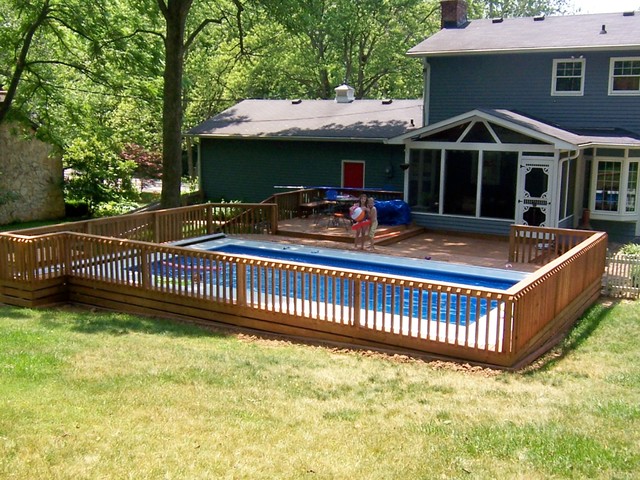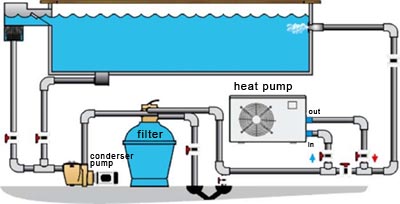Swimming Pools: Do They Add Value or Turn Buyers Off?
Posted by Steve Harmer on Saturday, December 26th, 2015 at 8:55am.
Swimming Pools.. Good idea?
I know its still winter but are you looking for a home with a pool? Here are some facts!!
 Sparkling blue water, especially when it's lit up at night – what's not to love about a swimming pool in your backyard? If you have one, you may feel blessed. If you don't, and are considering adding one, hang on a minute.
Sparkling blue water, especially when it's lit up at night – what's not to love about a swimming pool in your backyard? If you have one, you may feel blessed. If you don't, and are considering adding one, hang on a minute.
Who Wants a Pool?
According to Better Homes and Gardens Real Estate, middle-aged buyers with teenagers at home comprise the biggest market segment for homes with swimming pools. This makes sense when you consider how dangerous an un-fenced pool is for families with toddlers.
Another segment of home buyers who may find a pool desirable are younger couples who entertain frequently. There has been a lot of emphasis over the past few years on outdoor entertainment areas, including outdoor kitchens, fire pits, fireplaces and seating areas. A swimming pool frequently figures into these plans.
Location Always Counts
"Location, location, location" may just be a trite real estate mantra, but it is important nonetheless. If you live in Hawaii, Florida or the Southwest, a pool is far more in demand than for homes in Minnesota, Alaska or North Dakota.
Then, drill down your location even further. Even if you live in the desert climate of the Southwest, if there's a community pool a block away, installing a pool at home may be a waste of money. On the other hand, if your neighbors all have pools, you should probably consider putting one in.
How Big is Your Lot?
Lot size is a huge factor in deciding whether or not to have a swimming pool installed. Remember, if you have a small lot and the pool takes up the entire backyard, you are removing your home from consideration by buyers with small children and buyers who garden or entertain. Pet owners and young families typically want grassy areas where their pets and kids can play safely. Many seniors like to putter in the yard. If there is no room for any backyard activity other than swimming, you narrow the buyer field dramatically.
What is the Home's Value Right Now?
One of the most important factors to consider when thinking about adding a pool as a home improvement project is to not over-improve for the neighborhood. If you own a modest tract home in a neighborhood of similar homes, a pool may be overkill. The value of your home can only rise to that of the most expensive home in the area.
Owners of luxury homes in higher-priced neighborhoods with roomy backyards that appeal to buyers looking for a certain lifestyle may be able to justify the expense of installing a swimming pool. In fact, if you own a luxury home without a pool, you may lose buyers.
Type and Condition of the Pool
It should probably go without saying: If the pool is in poor condition or dirty, it will not add value to the home. If the pool is outdated, it won't add value. If the pool hasn't been maintained, the appraiser may even deduct from the home's value, according to Tim Page, owner of Appraisals by Page in Spokane, Washington. He suggests that if your pool is of the above-ground variety, it is considered personal property and it won't factor into the home's value. Be that as it may, if it is in poor condition it may turn off buyers, so take it down.

Factor in the Ongoing Cost of a Pool
Ongoing home maintenance costs are a turn-off for many buyers, and a pool may be a maintenance nightmare for them. Aside from the cost of pool installation, ongoing maintenance tasks such as heating and cleaning the pool, as well as the ongoing cost of a swimming pool, may be prohibitive to many buyers. Unfortunately, every pool is different in terms of how much electrical is used and therefore the monthly costs can vary significantly as well. So keep this in mind as you read the following, as these are General Guidelines.
2 Speed and Variable Speed Pump/Filter Systems (includes salt)
Pump manufacturers have become much more energy and cost conscious over the past 10 years or so, with most pool companies now making 2-speed and variable speed pumps a standard part of their basic installation. Although the high speed is used at times, (especially when vacuuming) the pump is not running full-speed nearly as often.
Typical Monthly Cost on Electric Bill: $30-$50
1-Speed Pump (includes salt)
This leaves the homeowner with 2 choices: Run the pump on high speed 24/7, or have it on a timer, turning on and off at 8 hour (average) intervals. As you can imagine, both these options have their drawbacks.
Average Monthly Cost: $75-$150
Heat Pumps
 Heat Pumps, which use electric instead of gas or propane, are a relatively efficient way to heat (and also cool) a swimming pool. Although the size of a heat pump does make some difference, the biggest factor on its electrical consumption has to do with the pool's location/region and ambient temperature outside. So for the sake of creating some type of estimate, most heat pumps will add $75-$250 per month in electrical expenses, again depending on their usage.
Heat Pumps, which use electric instead of gas or propane, are a relatively efficient way to heat (and also cool) a swimming pool. Although the size of a heat pump does make some difference, the biggest factor on its electrical consumption has to do with the pool's location/region and ambient temperature outside. So for the sake of creating some type of estimate, most heat pumps will add $75-$250 per month in electrical expenses, again depending on their usage.
Insurance costs. Insurance companies do not like insuring homes with swimming pools, according to Worters. "All pools – from a simple above-ground kiddy pool to an in-ground pool – can be dangerous and need to be properly insured and comply with local safety standards," she says.
A pool increases the homeowner's liability risk, so you may want to increase your liability coverage. "Liability limits generally start at about $100,000," Worters says. "However, experts recommend that you purchase at least $300,000 worth of protection. Pool owners should consider purchasing an umbrella liability policy. In today’s litigious society, $1 million of liability is nothing, especially if someone dies in your pool and the family sues."
Pools are meant to be fun, so getting a handle on the expected costs can help alleviate potential stress. "They should be part of your fun outdoor entertainment," Schoenberg says. "You want to have predictability in terms of cost, and you don't want to suddenly find out you have some huge repair."
Does a Pool Add Value?
 Most real estate agents will tell you that pools do not add value to a home, and for the most part this is true. What value a pool may add is small – typically about 8 percent of the home's value, according to the National Association of Realtors® National Center for Real Estate Research.
Most real estate agents will tell you that pools do not add value to a home, and for the most part this is true. What value a pool may add is small – typically about 8 percent of the home's value, according to the National Association of Realtors® National Center for Real Estate Research.
The decision to install a swimming pool should be based on your personal lifestyle and desire, not whether it will add value to the home.
© http://activerain.com/blogsview/4741278/swimming-pools-do-they-add-value-or-turn-buyers-off-

